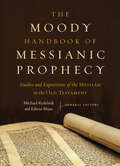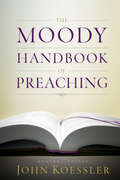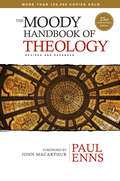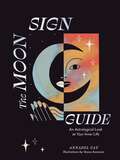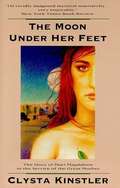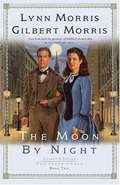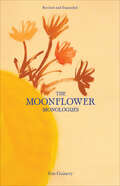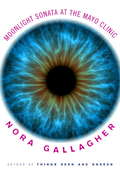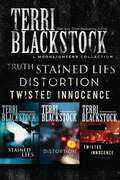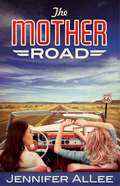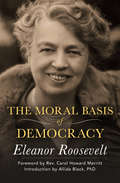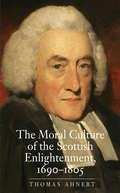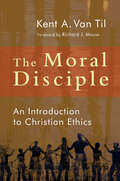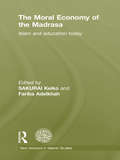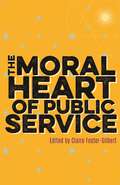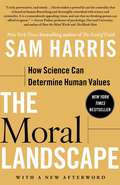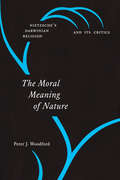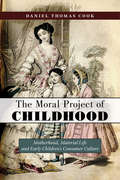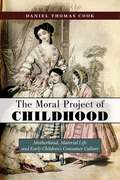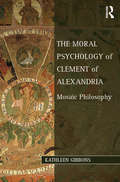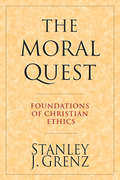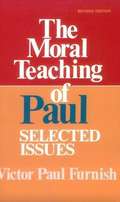- Table View
- List View
The Moody Handbook of Messianic Prophecy: Studies and Expositions of the Messiah in the Old Testament
by Michael Rydelnik and Edwin BlumThe ultimate, all-in-one resource on what the Old Testament says about JesusAs Jesus walked the Emmaeus road, he showed his companions how the whole of Scripture foretold his coming. Yet so often today we&’re not quite sure how to talk about Jesus in the Old Testament. How do you know what applies to Jesus? And how do you interpret some of the strange prophetic language?Get answers and clarity in this authoritative and reliable guide to messianic prophecy from some of the world&’s foremost evangelical Old Testament scholars. In this in-depth, user-friendly one volume resource you get: -essays from scholars on the big ideas and major themes surrounding Messianic prophecy-A clear and careful commentary on every passage in the Old Testament considered Messianic -Insights into the original Hebrew and helpful analysis of theological implicationsWatch the Scriptures come into full color as you see new meaning in familiar passages and further appreciate God&’s masterful handiwork in preparing the way for Jesus, the long-awaited Messiah.
The Moody Handbook of Preaching
by John Koessler"I can't tell you how many times I have preached and afterward promised God I would never embarrass Him like that again." — Joseph M. Stowell. Unnatural. Supernatural. A gift. Hard work. Exhilarating. Terrifying. These words only begin to describe the challenge and reward each pastor experiences. So what can assist today's pastors in such an endeavor? The Moody Handbook of Preaching. With contributors like Michael Easley, Joseph Stowell, and George Sweeting, these pages will reinvigorate you with an energizing love for preaching. And with topics such as evangelism, homiletics, and historical narrative, this book will equip you to be effective in today's postmodern age. A rich resource, The Moody Handbook of Preaching encompasses the philosophy, formation, and delivery of preaching. Whether you're a seminary student or a seasoned pastor, this book will prove invaluable in your call by God to preach.
The Moody Handbook of Preaching
by John Koessler"I can't tell you how many times I have preached and afterward promised God I would never embarrass Him like that again." — Joseph M. Stowell. Unnatural. Supernatural. A gift. Hard work. Exhilarating. Terrifying. These words only begin to describe the challenge and reward each pastor experiences. So what can assist today's pastors in such an endeavor? The Moody Handbook of Preaching. With contributors like Michael Easley, Joseph Stowell, and George Sweeting, these pages will reinvigorate you with an energizing love for preaching. And with topics such as evangelism, homiletics, and historical narrative, this book will equip you to be effective in today's postmodern age. A rich resource, The Moody Handbook of Preaching encompasses the philosophy, formation, and delivery of preaching. Whether you're a seminary student or a seasoned pastor, this book will prove invaluable in your call by God to preach.
The Moody Handbook of Theology
by Paul EnnsThe study of God, His nature, and His Word are all essential to the Christian faith. Now those interested in Christian theology have a newly revised and updated reference tool in the 25th Anniversary Edition of The Moody Handbook of Theology.In this classic and timeless one-volume resource, Paul Enns offers a comprehensive overview of the five dimensions of theology: biblical, systematic, historical, dogmatic, and contemporary. Each section includes an introduction, chapters on key points, specific studies pertinent to that theology, books for further study, and summary evaluations of each dimension. Charts, graphs, glossary, and indexes add depth and breadth. Theology, once the domain of academicians and learned pastors, is now accessible to anyone interested in understanding the essentials of what Christians believe. The Moody Handbook of Theology is a concise doctrinal reference tool for newcomers and seasoned veterans alike.
The Moody Handbook of Theology
by Paul EnnsThe study of God, His nature, and His Word are all essential to the Christian faith. Now those interested in Christian theology have a newly revised and updated reference tool in the 25th Anniversary Edition of The Moody Handbook of Theology.In this classic and timeless one-volume resource, Paul Enns offers a comprehensive overview of the five dimensions of theology: biblical, systematic, historical, dogmatic, and contemporary. Each section includes an introduction, chapters on key points, specific studies pertinent to that theology, books for further study, and summary evaluations of each dimension. Charts, graphs, glossary, and indexes add depth and breadth. Theology, once the domain of academicians and learned pastors, is now accessible to anyone interested in understanding the essentials of what Christians believe. The Moody Handbook of Theology is a concise doctrinal reference tool for newcomers and seasoned veterans alike.
The Moon Sign Guide: An Astrological Look at Your Inner Life
by Annabel GatFrom Annabel Gat, the author of The Astrology of Love & Sex, comes a fascinating guide that provides a deeper look at Moon signs—the zodiac sign the moon occupied at one's birth.Most casual fans of astrology are familiar with their Sun sign, but your Moon sign is just as essential to your astrological profile. While the Sun sign symbolizes your ego and will, your Moon sign represents your inner world, your emotional landscape—your feelings, memories, and subconscious; your fears, needs, and desires.Organized into twelve chapters, one for each Moon sign, The Moon Sign Guide details the characteristics and personality traits for each sign in relation to key aspects of life, including self-care, home, family, work, friendship, love, and compatibility. The book also includes a glimpse into progressed moons because as you age, your Moon sign changes, providing new emotional perspectives.Illustrated throughout and packaged as a lovely hardcover with foil-stamping and gilded edges, The Moon Sign Guide is an invaluable reference for astrology enthusiasts of all levels and modern mystics looking to explore lunar energies and gain deeper insights into themselves and others.EXPERT AUTHOR: Annabel Gat writes the daily and monthly horoscope column at VICE. She is a practicing astrologer certified by the International Society for Astrological Research.ACCESSIBLE: Organized into twelve easy-to-navigate chapters (from Aires Moon to Pisces Moon), this guide is packed with information that will appeal to astrology fans of all levels. And every two and half years, your progressed Moon sign changes, making this guidebook a handy reference you'll turn to for many years to come.EXCELLENT SELF-DISCOVERY TOOL: Astrology is a wonderful way to further explore and care for yourself and your emotional well-being. By learning about your Moon sign, you learn more about who you are and what you need to feel emotionally secure, safe, and nurtured.EYE-CATCHING PACKAGE: With foil stamping on the cover, silver gilded edges, and vibrant illustrations throughout, this book makes a lovely gift for zodiac lovers and anyone captivated by the powerful and mysterious moon, and an excellent companion to The Astrology of Love & Sex.Perfect for:• Astrology enthusiasts of all levels, horoscope readers, and anyone who can't get enough of all things zodiac• Fans of wicca, mysticism, spirituality, and tarot• Those who enjoyed The Astrology of Love & Sex, The Only Astrology Book You'll Ever Need, and You Were Born for This
The Moon Under Her Feet
by Clysta KinstlerFictional feminist history of Jesus Christ and Biblical events, from the point of view of Mary Magdalene.
The Moon Under Her Feet
by Clysta KinstlerOn the day I was given to the Goddess I awakened before daylight, a strange fluttering inside me. The excitement that had wakened me combined with the cold, and I shivered, pulling my cloak around me. I went outdoors with the milking bowl and breathed in the sweet air. Hanging the bowl on Nadja's tether post, I faced into the dawn breeze and climbed the little rise behind our house. The sparse grass showed weak new growth at the crown of the hill where it lay open to the dew and fight frost of the winter just past. There had been little rain this year or the one before, and though my parents worried about it in their talk, I thought little of it. I saw only that sunny days were better than rainy ones."She was there -- the Morning Star -- just as Grandmother Lili had promised, brilliant in the brightening sky above the far roofs of Jerusalem, and beneath her, just rising over the dark shape of the Temple, the slimmest crescent moon. The cold wind flapped my cloak about me, but I did not feel it, overcome as I was by that heavenly sign. The Goddess was smiling her blessing on my special day, and the moon was under her feet.Presently, chilled, I trudged down the hill and got the bowl. Nadja already stood expectantly on her milking bench watching me with soft eyes. I put two handfuls of oats in her box, and she chewed happily, moving her little jaws and flicking her long ears rapidly. "I told you I would milk for you this morning, Mari, because your hair is just washed for the festival! Now you will smell like a goat," my mother scolded, holding the dark cloud of her hair away from her face while the dawn wind billowed it about her. I pressed my forehead against Nadja's round belly, stripping out the last drops of milk. "Nadja smells good."
The Moon by Night (Cheney And Shiloh: The Inheritance Ser. #2)
by Gilbert Morris Lynn MorrisCheney and Shiloh Irons-Winslow return to New York from their honeymoon in the West Indies eager to resume their careers. Cheney is thrilled with the newly opened St. Luke the Physician Hospital, which she helped design and renovate. To her dismay, however, it soon appears that several surgeries have been compromised and patients are contracting new illnesses rather than getting well. As evidence of foul play mounts, Cheney works feverishly to expose the true villain and reveal the desperate secrets that fuel these crimes. Shiloh is running the Winslow Brothers Shipping Company, but it soon is so well organized that boredom haunts him. Cheney is so caught up in medical emergencies, day and night, that he must visit her at the hospital. Though Shiloh’s nursing experience could alleviate some of the stress, Cheney believes he doesn’t want to return to medicine and determines not to ask for his help. Will her resolve drive a wedge between them? In the Midst of Growing Adversity, Their Love is Put to the Test
The Moonflower Monologues
by Tess GuineryFrom celebrated Australian artist Tess Guinery comes The Moonflower Monologues, her second book of beautifully designed poetry and prose. This collection is many things: an exploration of strength and femininity, an invitation to let things go wrong, a reminder that growth comes in many forms, and an acknowledgment that &“some things can&’t be written in sugar, only salt.&” Some of the writings are extravagant, some are sparse, but all are infused with Guinery&’s introspection, stillness, and kindness.
The Moonlight Sonata at the Mayo Clinic
by Nora GallagherThis taut yet lyrical memoir tells of the author's experience with a baffling illness poised to take her sight, and gives a deeply felt meditation on vulnerability and on what it means to lose the faith you had and find something better. One day at the end of 2009, during a routine eye exam that Nora Gallagher nearly skipped, her doctor said, "Darn." Her right optic nerve was inflamed, the cause unknown, a condition that if left untreated would cause her to lose her sight. And so began her departure from ordinary life and her travels in what she calls Oz, the land of the sick. It looks like the world most of us inhabit, she tells us, except that "the furniture is slightly rearranged": her friends can't help her, her trusted doctors don't know what's wrong, and what faith she has left just won't cover it. After a year of searching for a diagnosis and treatment, she arrives at the Mayo Clinic and finds a whole town built around Oz.In the course of her journey, Gallagher encounters inhuman doctors, the modern medical system--in which knowledge takes fifteen years to trickle down--and the strange world that is the famous Mayo Clinic, complete with its grand piano. With unerring candor, and no sentimentality whatsoever, Gallagher describes the unexpected twists and turns of the path she took through a medical mystery and an unfathomably changing life. In doing so, she gives us a singular, luminous map of vulnerability and dark landscapes. "It's the nature of things to be vulnerable," Gallagher says. "The disorder is imagining we are not."
The Moonlighters Collection: Truth Stained Lies, Distortion, Twisted Innocence (Moonlighters Series)
by Terri BlackstockTerri Blackstock’s bestselling Moonlighters trilogy—now available in one volume! Truth Stained Lies When truth doesn’t make sense, will lies prevail? Distortion A husband’s lies can have deadly consequences. Twisted Innocence Holly Cramer’s past choices have finally caught up to her, but she never expected them to endanger her baby.
The Mor Road
by Jennifer AlleeWithin the course of a week, Natalie is dumped by her husband, receives an urgent call home from her father, and discovers her estranged sister is pregnant. A road trip on Route 66 may not help, but it sure couldn't hurt. Or so Natalie thinks, until Lindsay's boyfriend starts stalking them. Will their trip down the Mother Road bring the two sisters closer together or turn out to be the biggest wrong turn yet?
The Moral Basis of Democracy
by Eleanor RooseveltA wartime manifesto on the moral obligations of democratic citizens from the most influential first lady in American history. With the threat of the Third Reich looming, Eleanor Roosevelt employs the history of human rights to establish the idea that at the core of democracy is a spiritual responsibility to other citizens. Roosevelt then calls on all Americans, especially the youth, to prioritize the well-being of others and have faith that their fellow citizens will protect them in return. She defines this trust between people as a trait of true democracy. Roosevelt advances an optimistic model for the democracy of the future, and although we&’ve taken some steps in the direction of her vision, it&’s still a long way from reality. The issues first addressed in this 1940 essay—namely financial inequality and racial discrimination—are sadly still relevant today, as bigotry continues to undermine our national unity. Her first publication as first lady, The Moral Basis of Democracy is an honest and heartfelt call for all Americans to choose love and faith over hatred and fear. Roosevelt takes an inspiring stance in defense of democracy, progress, and morality; the wisdom imparted here is timeless, and a must-read for every American. This edition features a foreword by Rev. Carol Howard Merritt, an introduction by Roosevelt historian Allida Black, PhD, and an illustrated biography of Eleanor Roosevelt including images from the author&’s estate.
The Moral Culture of the Scottish Enlightenment
by Thomas AhnertIn the Enlightenment it was often argued that moral conduct, rather than adherence to theological doctrine, was the true measure of religious belief. Thomas Ahnert argues that this "enlightened" emphasis on conduct in religion relied less on arguments from reason alone than has been believed. In fact, Scottish Enlightenment champions advocated a practical program of "moral culture," in which revealed religion was of central importance. Ahnert traces this to theological controversies going back as far as the Reformation concerning the conditions of salvation. His findings present a new point of departure for all scholars interested in the intersection of religion and Enlightenment.
The Moral Disciple: An Introduction to Christian Ethics
by Kent A. Van TilThe ability to judge good from bad, right from wrong, is a uniquely human characteristic. However, given the complexity of life, it is often difficult to discern which choice to make, where our responsibilities lie, or what the consequences of an action (or of a nonaction) will be. In The Moral Disciple Kent Van Til surveys the skills and dispositions that we need to address moral issues responsibly. This basic introduction to Christian ethics — the systematic evaluation of morality — highlights the centrality of Christ and the Christian faith in moral formation, and it offers an ethical framework to guide Christians as they engage a host of moral dilemmas, including those surrounding wealth, sexuality, and the end of life. Using easy-to-read prose and defining terms carefully, Van Til provides an accessible introduction to this crucial and practical subject.
The Moral Economy of the Madrasa: Islam and Education Today (New Horizons in Islamic Studies)
by Fariba Adelkhah Sakurai KeikoThe revival of madrasas in the 1980s coincided with the rise of political Islam and soon became associated with the "clash of civilizations" between Islam and the West. This volume examines the rapid expansion of madrasas across Asia and the Middle East and analyses their role in society within their local, national and global context. Based on anthropological investigations in Afghanistan, Bangladesh, China, Iran, and Pakistan, the chapters take a new approach to the issue, examining the recent phenomenon of women in madrasas; Hui Muslims in China; relations between the Iran’s Shia seminary after the 1979-Islamic revolution and Shia in Pakistan and Afghanistan; and South Asian madrasas. Emphasis is placed on the increased presence of women in these institutions, and the reciprocal interactions between secular and religious schools in those countries. Taking into account social, political and demographic changes within the region, the authors show how madrasas have been successful in responding to the educational demand of the people and how they have been modernized their style to cope with a changing environment. A timely contribution to a subject with great international appeal, this book will be of great interest to students and scholars of international politics, political Islam, Middle East and Asian studies and anthropology.
The Moral Heart of Public Service
by William Hague Rowan Williams John Hall Andrew Tremlett Claire Foster-Gilbert Mary Mcaleese Peter Hennessy Stephen Lamport The Dean Westminster Vernon WhiteNow more than ever, public servants must consider and reassess how to keep moral courage in public life alive. With ethical expectations and needs changing and government policies under increasing moral scrutiny, Claire Foster-Gilbert of Westminster Abbey Institute gathers a series of essays and lectures by herself and others, exploring the meaning of 'moral code' in today's public service, and how it can be rekindled in practice. Timely and timeless, the book is founded on traditional values of honesty, moral rigour and neighbourliness, and discusses how to champion stability, peace, community and virtue in contemporary public life. The authors, including eminent figures such as the former President of Ireland Mary McAleese, historian Peter Hennessy, former First Secretary of State William Hague and former Archbishop of Canterbury Rowan Williams, explain how realistic compromises can be balanced with clear goal-setting for ideal results. Forward-thinking and authoritative, this book will be a precious resource to anyone seeking to boost the circulation of integrity throughout all aspects of public life.
The Moral Landscape: How Science Can Determine Human Values
by Sam HarrisNew York Times bestselling author Sam Harris&’s first book, The End of Faith, ignited a worldwide debate about the validity of religion. In the aftermath, Harris discovered that most people—from religious fundamentalists to non-believing scientists—agree on one point: science has nothing to say on the subject of human values. Indeed, our failure to address questions of meaning and morality through science has now become the primary justification for religious faith.In this highly controversial book, Sam Harris seeks to link morality to the rest of human knowledge. Defining morality in terms of human and animal well-being, Harris argues that science can do more than tell how we are; it can, in principle, tell us how we ought to be. In his view, moral relativism is simply false—and comes at an increasing cost to humanity. And the intrusions of religion into the sphere of human values can be finally repelled: for just as there is no such thing as Christian physics or Muslim algebra, there can be no Christian or Muslim morality. Using his expertise in philosophy and neuroscience, along with his experience on the front lines of our “culture wars,” Harris delivers a game-changing book about the future of science and about the real basis of human cooperation.
The Moral Meaning of Nature: Nietzsche’s Darwinian Religion and Its Critics
by Peter J. WoodfordWhat, if anything, does biological evolution tell us about the nature of religion, ethical values, or even the meaning and purpose of life? The Moral Meaning of Nature sheds new light on these enduring questions by examining the significance of an earlier—and unjustly neglected—discussion of Darwin in late nineteenth-century Germany. We start with Friedrich Nietzsche, whose writings staged one of the first confrontations with the Christian tradition using the resources of Darwinian thought. The lebensphilosophie, or “life-philosophy,” that arose from his engagement with evolutionary ideas drew responses from other influential thinkers, including Franz Overbeck, Georg Simmel, and Heinrich Rickert. These critics all offered cogent challenges to Nietzsche’s appropriation of the newly transforming biological sciences, his negotiation between science and religion, and his interpretation of the implications of Darwinian thought. They also each proposed alternative ways of making sense of Nietzsche’s unique question concerning the meaning of biological evolution “for life.” At the heart of the discussion were debates about the relation of facts and values, the place of divine purpose in the understanding of nonhuman and human agency, the concept of life, and the question of whether the sciences could offer resources to satisfy the human urge to discover sources of value in biological processes. The Moral Meaning of Nature focuses on the historical background of these questions, exposing the complex ways in which they recur in contemporary philosophical debate.
The Moral Project of Childhood: Motherhood, Material Life, and Early Children's Consumer Culture
by Daniel Thomas CookExamines the Protestant origins of motherhood and the child consumer Throughout history, the responsibility for children’s moral well-being has fallen into the laps of mothers. In The Moral Project of Childhood, the noted childhood studies scholar Daniel Thomas Cook illustrates how mothers in the nineteenth-century United States meticulously managed their children’s needs and wants, pleasures and pains, through the material world so as to produce the “child” as a moral project. Drawing on a century of religiously-oriented child care advice in women’s periodicals, he examines how children ultimately came to be understood by mothers—and later, by commercial actors—as consumers. From concerns about taste, to forms of discipline and punishment, to play and toys, Cook delves into the social politics of motherhood, historical anxieties about childhood, and early children’s consumer culture. An engaging read, The Moral Project of Childhood provides a rich cultural history of childhood.
The Moral Project of Childhood: Motherhood, Material Life, and Early Children's Consumer Culture
by Daniel Thomas CookExamines the Protestant origins of motherhood and the child consumer Throughout history, the responsibility for children’s moral well-being has fallen into the laps of mothers. In The Moral Project of Childhood, the noted childhood studies scholar Daniel Thomas Cook illustrates how mothers in the nineteenth-century United States meticulously managed their children’s needs and wants, pleasures and pains, through the material world so as to produce the “child” as a moral project. Drawing on a century of religiously-oriented child care advice in women’s periodicals, he examines how children ultimately came to be understood by mothers—and later, by commercial actors—as consumers. From concerns about taste, to forms of discipline and punishment, to play and toys, Cook delves into the social politics of motherhood, historical anxieties about childhood, and early children’s consumer culture. An engaging read, The Moral Project of Childhood provides a rich cultural history of childhood.
The Moral Psychology of Clement of Alexandria: Mosaic Philosophy (Studies in Philosophy and Theology in Late Antiquity)
by Kathleen GibbonsIn The Moral Psychology of Clement of Alexandria, Kathleen Gibbons proposes a new approach to Clement’s moral philosophy and explores how his construction of Christianity’s relationship with Jewishness informed, and was informed by, his philosophical project. As one of the earliest Christian philosophers, Clement’s work has alternatively been treated as important for understanding the history of relations between Christianity and Judaism and between Christianity and pagan philosophy. This study argues that an adequate examination of his significance for the one requires an adequate examination of his significance for the other. While the ancient claim that the writings of Moses were read by the philosophical schools was found in Jewish, Christian, and pagan authors, Gibbons demonstrates that Clement’s use of this claim shapes not only his justification of his authorial project, but also his philosophical argumentation. In explaining what he took to be the cosmological, metaphysical, and ethical implications of the doctrine that the supreme God is a lawgiver, Clement provided the theoretical justifications for his views on a range of issues that included martyrdom, sexual asceticism, the status of the law of Moses, and the relationship between divine providence and human autonomy. By contextualizing Clement’s discussions of volition against wider Greco-Roman debates about self-determination, it becomes possible to reinterpret the invocation of “free will” in early Christian heresiological discourse as part of a larger dispute about what human autonomy requires.
The Moral Quest: Foundations of Christian Ethics
by Stanley J. GrenzVoted one of Christianity Today's 1998 Books of the Year What is ethics? Why should Christians care? Beginning with these basic questions, Stanley Grenz masterfully leads his readers into a theological engagement with moral inquiry. In The Moral Quest he sets forth the basics of ethics, considers the role and methods of Christian ethics in particular, and examines the ethical approaches of the Old Testament, the Gospels and Paul. He introduces the foundational theological ethics of Augustine, Thomas Aquinas, and Luther and the Reformers. And he concludes with an evenhanded discussion of modern and contemporary Christian ethicists, including Albert Ritschl, Walter Rauschenbusch, Karl Barth, James Gustafson, Paul Ramsey, Dietrich Bonhoeffer, Martin Luther King Jr., Gustavo Gutiérrez, Rosemary Radford Ruether, Stanley Hauerwas, Carl F. H. Henry and Oliver O'Donovan. Clear, concise, and well apprised of relevant literature, Grenz (a theologian recognized for the excellence of his own theological and ethical work) provides in this book a first-rate introduction to Christian ethics. The Moral Quest will well serve students, pastors and interested laypersons alike.
The Moral Teaching of Paul: Selected Issues
by Victor Paul FurnishDr. Furnish enriches his discussion of key Pauline topics including: sex, marriage, divorce, homosexuality, women in the church, and the Church in the world. He pays particular attention to the socio-cultural context of Paul's ministry, the complexity of his thought, the character of his moral reasoning, and the way his thought and reasoning may inform and challenge us today.
